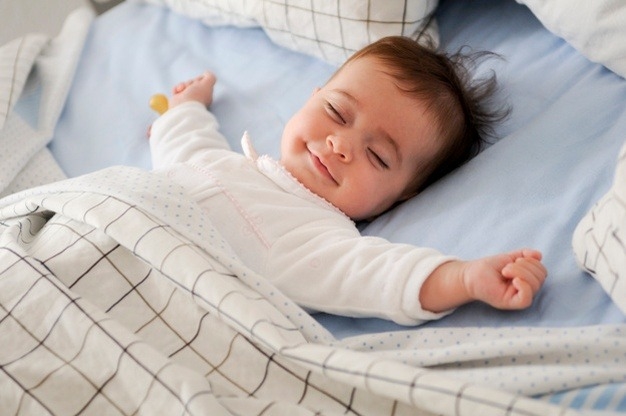
At What Age Do Children Start Dreaming?
14 Feb 2019 | 4 min Read
Revati Narayanswamy
Author | 52 Articles
Dreams can be defined as a series of thoughts, images, and sensations occurring in a person’s mind during sleep. There are five stages of sleep. Four stages are the Non – REM sleep and one is called REM sleep (Rapid Eye Movement). We, adults, spend a quarter of our sleep time in REM sleep which is also the stage of sleep in which we dream. Infants spend about 50 to 80 percent of their sleep time in the REM phase. It is a possibility that infants dream during this stage but, very difficult to establish anything as you cannot ask a baby to narrate their dream.
REM sleep is lighter and a more active sleep than NON – REM sleep. We tend to wake up more easily in the REM sleep. This will also solve your doubt on why do babies wake up so frequently at night and why do they take shorter naps.
Do Babies Dream?
It is very much possible as they spend more of their sleep time in REM sleep but, it is very difficult to compare an adult dream to that of a baby. Adult dreams involve more complex feelings, emotions, language and a series of events mostly. Babies do not have that kind of development at such an early stage of their lives. During the initial years, babies grow and develop during their sleep time. That is why it is so important for children to be allowed an ample amount of sleep time. During REM sleep, a baby’s brain is developing new neural pathways. There have been experiments conducted wherein babies have shown a learning process during their sleep time. So, if your child’s brain is busy functioning over time even during sleep, then that doesn’t leave much room for dreams to pop in☺.
Most cognitive psychologists believe that kids really start to have dreams with a sensible plotline when they are about 5 to 7 years old. This is around the time wherein they develop a sense of self, which is necessary to insert themselves into dreams and they are also learning the more complex emotions and language skills. However, do not be surprised if your 3 or 4-year-old comes up to you one morning and reiterates a dream that they saw. They too have acquired a few skills in those many years enough to put it in a vivid dream.
Nightmares
A nightmare can be defined as a frightening or unpleasant dream. Adults experience nightmares more often than babies. About one-quarter of children have nightmares every week. Nightmares begin when the child is about 2 years, an age where they start understanding the concept of fear a little bit. It peaks between the age of three and six years. Nightmares usually occur during the sleep cycle between 4 am to 6 am.
The explanation for nightmares is not known, however, it’s thought to be due to the normal stresses and strains of growing up. Children who have toughened a traumatic event, for instance, tend to have frequent nightmares for the following six months preceding the event more or less.
If your child is experiencing nightmares then please do not ignore him / her. Cuddle your child and be there for them. Reassure them that they need not be scared and you are around.
So, here comes your moment of truth. Babies in all probability don’t dream much, however don’t fret yourself concerning the logistics of it – there’s necessary business occurring within that small head when he / she snoozes.
Also read: Infant Sleep Patterns – Help Your Child Sleep Better
A


Related Topics for you
Suggestions offered by doctors on BabyChakra are of advisory nature i.e., for educational and informational purposes only. Content posted on, created for, or compiled by BabyChakra is not intended or designed to replace your doctor's independent judgment about any symptom, condition, or the appropriateness or risks of a procedure or treatment for a given person.
